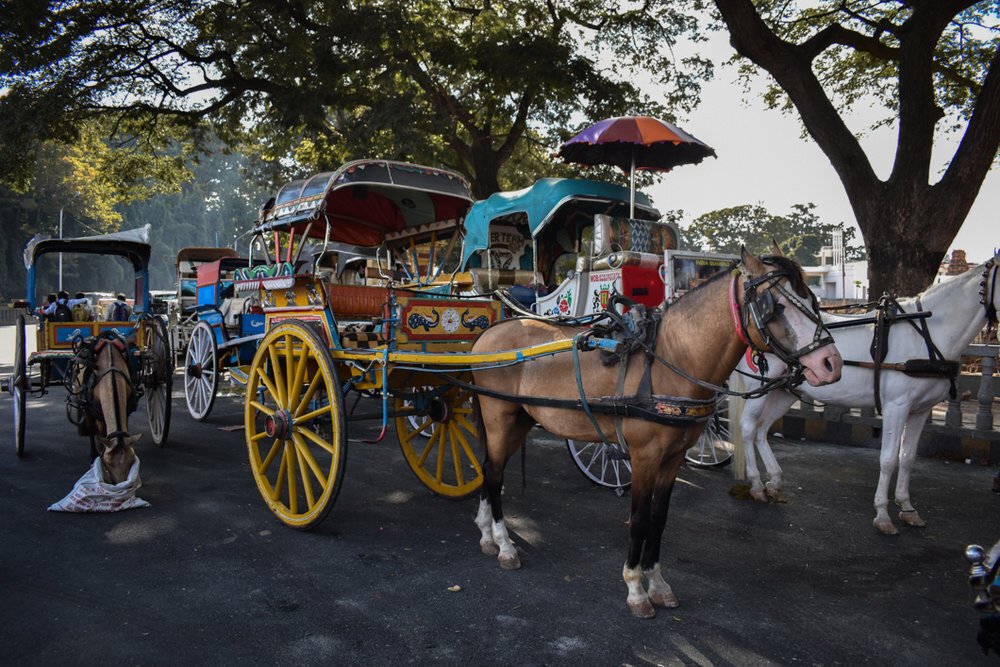New York City Carriage Horse Dies, Renews Calls for Citywide Ban
The latest death has renewed the call for a ban on carriage horses in the busy streets of NYC.
In tourist destinations around the world, horses are used to pull carriages. Credit: Amy Jones/Moving Animals
The death of a New York City carriage horse last week has renewed calls for a citywide ban to help prevent any further horse deaths in the industry.
Black Jack, a 17-year-old horse, passed away after suffering from colic, an illness that causes abdominal pain in horses. The horse’s owner noticed that Black Jack was suffering from the condition and spoke with veterinarians, but the horse died before the vet arrived, reports local news outlet amNewYork Metro.
Animal welfare groups say that the painful condition of colic can be avoided, by allowing horses a proper diet, grazing on pasture, and basic veterinary care.
Black Jack had apparently not been given a veterinary exam since February 28, according to New Yorkers for Clean, Livable, and Safe Streets (NYCLASS), a local group who are campaigning for a ban on horse carriages in the city.
NYCLASS say that colic is listed as a common cause of death for NYC carriage horses.
"The tragic and agonizing death of Blackjack is another harrowing reminder of the horse owner lobby’s persistent neglect and callous disregard for these animals”, said Edita Birnkrant, Executive Director of NYCLASS.
“This is not an isolated incident, but a reflection of a profit-driven system that treats horses as expendable commodities”, Birnkrant explains.
New York’s Horse Carriage Problem
The city’s horse carriage industry has faced increasing condemnation in recent years after a series of incidents made headlines in national and international news outlets. In 2022, viral footage was widely shared of a horse collapsing after pulling a heavy carriage through Midtown’s busy streets during a heatwave. The video clips from concerned onlookers showed carriage horse, Ryder, being whipped and hit by his owner while the horse was in a collapsed state. Ryder was euthanized a few months later.
Collapsed Ryder in the viral footage. Credit: Voters For Animal Rights
Other notable incidents include 12-year-old mare, Aisha, who collapsed and died while giving carriage rides in Central Park back in 2020. Before her death, she was filmed stumbling and unable to straighten her back legs, before completely collapsing. In an effort to make her stand, carriage-industry workers appeared to blow smoke into Aisha’s face, leading her to flip over in terror.
And in 2021, a New York carriage horse named Chief crashed into the back of a BMW and suffered deep lacerations to his midsection, head, and front right leg.
Solutions for Change
Globally, popular tourist destinations that allow carriage horses have increasingly faced calls to ban the practice and provide more ethical alternatives. Dominican Republic’s historic capital city of Santo Domingo has replaced horse-drawn carriages with modern, animal-free electric carriages, while the city of Chicago banned horse-drawn carriage rides after a decade-long attempt to regulate the industry failed to help protect the horses.
Animal welfare organizations hoped that Chicago’s ban in 2020 on carriage horses in the city would influence other cities to follow suit and become carriage-free too.
So far, New York has resisted growing calls for a ban despite recent horse deaths and injuries. Now, Species Unite is urging New York councilors to pass Ryder’s Law - legislation that will transition the current horse drawn carriages to horse-less electric carriages. Add your name to the petition here.
We Have A Favor To Ask…
Species Unite amplifies well-researched solutions to some of the most abusive animal industries operating today.
At this crucial moment, with worldwide momentum for change building, it’s vital we share these animal-free solutions with the world - and we need your help.
We’re a nonprofit, and so to keep sharing these solutions, we’re relying on you - with your support, we can continue our essential work in growing a powerful community of animal advocates this year.
More stories:
Species Unite
A collection of stories of those who fight the good fight on behalf of animals.





A new study has revealed a landmark process that can now create bigger pieces of whole meat - without needing to farm an animal.